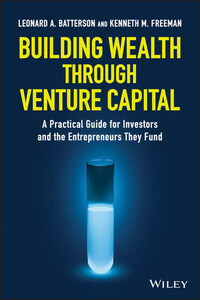Building Wealth through Venture Capital

Advance Praise for Moving the Rock “The future comes at us fast – which means school reformers don’t have time to wait. They need real tools in real time. That’s why Moving the Rock is so important. Grant Lichtman has guidance for anyone – teachers, parents, administrators, government officials – intent on helping young people succeed not ‘someday,’ but today.” – Daniel H. Pink, best-selling author of Drive and A Whole New Mind “Grant Lichtman’s book is a clear and comprehensive guide to the “what" and the “how” of educational transformation. Organized around essential levers for change, it is a must-read for anyone who wants to make a difference in our schools.” —Tony Wagner, Harvard Ilab Expert in Residence, and best-selling author of The Global Achievement Gap and Creating Innovators” “This book gives me hope for a brighter future in education. Despite the dark clouds imposed by misguided policies, Grant Lichtman diligently tells stories of grass-roots innovations in the classrooms and schools all over the world. Moving the Rock is an inspiring call to action for all educators.” —Yong Zhao, Ph.D., Foundation Distinguished Professor, School of Education, University of Kansas “If you have children, or teach children, or want our children to succeed, this is a must-read book. Grant Lichtman throws down the challenge for all of us; that WE can change education, and he shows us just how successful schools everywhere are overcoming change-killing inertia in our schools.” —Todd Rose, best-selling author of The End of Average; Harvard University Moving the Rock: Seven Levers WE Can Press to Transform Educationgives educators, parents, administrators, students, and other stakeholders a clear paradigm for transforming our outmoded schools into schools that will help our children to meet the challenges of tomorrow. It’s no secret that our educational system is stuck. Moving the Rock shows the important roles all of us can play in un-sticking it by moving seven specific levers that will change the focus of education from what we teach to how we learn. Importantly, moving the levers is completely possible today, and in fact is already happening now in many schools. Drawing on research and extensive experience in the education community, Grant Lichtman outlines the seven essential levers that can profoundly change our schools so that we are teaching all our children how to learn, including • Creating the Demand for Better Schools • Building School-Community Learning Laboratories • Encouraging Open Access to Knowledge • Fixing How We Measure Student Success • Teaching the Teachers what They Really Need to Know • and more At the end of each of each chapter there are one or more challenges, ways that all of us can collectively turn the pioneering work of others into transformation for all our schools.







